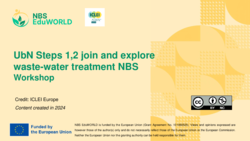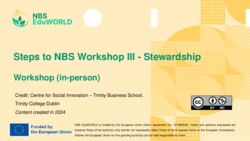
Learning Units
The NBS EduWORLD Learning Units page offers a comprehensive and flexible suite of resources designed to integrate Nature-Based Solutions (NBS) into higher education and professional training. With 50 curated Learning Units, this platform supports educators, students, and practitioners at all levels—undergraduate (UG), postgraduate (PG), doctoral (PhD), vocational, and entrepreneurial.
Covering a broad spectrum of themes and contexts, the Learning Units are structured around key educational streams:
- Common Core Units introduce foundational NBS concepts, such as ecosystem services, biodiversity, and the SDGs.
- 3rd Level Units target university-level learners, with a focus on implementation, policy, social inclusion, and future urban development.
- Entrepreneurial Units support learners exploring nature-based enterprises, business models, green finance, and sector-specific NBS opportunities.
- Vocational Units are tailored for practical skills development, project management, policy engagement, and multi-level governance.
- Case Studies and Workshops offer real-world applications and participatory methods from NBS EduWORLD demonstrator sites across Europe.
Each unit is aligned with European Qualification Framework (EQF) levels, ranging from Level 6 to Level 8, ensuring academic relevance and adaptability.
These Learning Units are editable and adaptable, supporting custom integration into curricula, practice-oriented, blending theory with applied learning, and geographically diverse, reflecting urban, rural, and coastal NBS contexts.
Download the full list of Learning Units
Whether you're a lecturer seeking ready-to-use teaching materials, a student exploring sustainability, or a professional upskilling in green innovation, the NBS EduWORLD Learning Units offer a unique, user-friendly gateway into nature-based thinking and action.
Search results ( 1 - 5 of 7 )
Introducing UbN for learning on wastewater treatment NBS
Join and explore the topic of NBS for wastewater treatment and its benefits for a more sustainable wastewater management, including wastewater treatment and reuse at the source, as well as increased greening and biodiversity, and engage in a multi-stakeholder discussion for identifying common regulatory, governamental and financial barriers and ways to overcome them for the mainstreaming of cross-collaborative frameworks and co-design of these solutions in the learners individual settings.
Find here the editable version and the teaching note.
Educational Level: Professional
Language: English
Organisation: ICLEI

NBS In and Out Lab
NBS In And Out Lab is an educational hands-on activity that aims to promote NBS through education outside the classroom, and is directly linked to the established curriculum. This adopts a student-centered pedagogical model, the Student Focus Approach, that is based on socio-constructivist approach: students’ own activity, their prior knowledge, peer-collaboration and learning together. This can be incorporated into STEAM or other multidisciplinary science (biology, chemistry, physics and other subjects) lessons or projects. This learning unit Is developed for learners who are studying education, teachers and those interested in educating young people about NBS.
Find here the editable version and the teaching note.
Educational Level: Professional
Language: English
Organisation: TCD

Steps to NBS Workshop I - Planning and Introducing Co-Production
This is the first of three workshop sessions navigating workshop participants through the initial planning stages of an NBS implementation with a focus on co-production. This learning unit workshop focuses on planning the goals drawing on the Connecting Nature one of the seven interrelated elements: co-production described during this workshop. Participants will consider a community context (e.g. space, location) for an NBS either from their professional or personal experience to work through workshop activities including to consider co-production activities including stakeholder mapping and the roles of key actors in the development of NBS.
Find here the editable version and the teaching note.
Educational Level: Higher Education
Language: English
Organisation: TCD

Steps to NBS Workshop II - Delivery with Co-Production
This is the second of three workshop sessions navigating workshop participants through the steps to the delivery of the coproduction of NBS in urban, rural or coastal context. This learning unit workshop focuses on delivery planning the goals drawing on the Connecting Nature Framework element: co-production. Participants are encouraged to consider a community context, that is, selecting an NBS in terms of location and scale, either from their professional or personal experience to work through workshop activities, including an assessment of the social, environmental and economic needs.
Find here the editable version and the teaching note.
Educational Level: Higher Education
Language: English
Organisation: TCD

Steps to NBS Workshop III - Stewardship
This is the third of three workshop sessions navigating participants through the steps to the stewardship of NBS in an urban context. Following the planning and delivery of an NBS intervention, this workshop focuses on stewardship (maintaining, monitoring and evaluation) navigating the Connecting Nature Framework. In this final iterative process of developing NBS, participants are encouraged to consider a community context, either from their professional or personal experience to apply to workshop activities.
Find here the editable version and the teaching note.
Educational Level: Higher Education
Language: English
Organisation: TCD


Funded by the European Union. Views and opinions expressed are however those of the author(s) only and do not necessarily reflect those of the European Union or the European Commission. Neither the European Union nor the granting authority can be held responsible for them.